In the era of information overload, the best AI research tools have become essential for researchers, academics, and students, enabling them to analyze vast amounts of data, access relevant academic papers, and extract key insights quickly and accurately. By leveraging Natural Language Processing (NLP) and machine learning techniques, these AI-powered tools can save time, enhance analysis quality, and accelerate scientific discoveries.
Whether you are a student searching for sources for a project or an academic aiming to stay updated with the latest advancements in your field, AI research assistants provide efficiency, automation, and smarter ways to streamline the research process.
What is an AI Research Tool?
An AI research tool is a software application powered by artificial intelligence (AI) designed to assist researchers, academics, and students in various aspects of the research process. These tools leverage machine learning, natural language processing (NLP), and automation to help users find relevant academic papers, analyze data, summarize information, generate citations, and enhance literature reviews efficiently.
With the increasing volume of scholarly publications and data, AI-powered research assistants streamline workflows, improve accuracy, and save time by automating tasks that traditionally required extensive manual effort.
Key Functions of AI Research Tools:
- Academic Search & Literature Review: AI can filter and recommend relevant research papers based on keywords and topics.
- Citation Management & Verification: Some tools analyze citations to ensure accuracy and credibility in research.
- Summarization & Content Extraction: AI-powered summarizers condense long research papers into concise, digestible insights.
- Data Analysis & Visualization: AI helps in structuring complex data, generating insights, and creating visual representations.
- Plagiarism & AI Detection: Some tools check the originality of research content and detect AI-generated text.
By utilizing AI-powered research tools, academics and researchers can enhance productivity, reduce errors, and focus on deeper analysis rather than administrative tasks.
7 best AI Research Assistants to use in 2025
Below is a list of the 7 best AI research tools that can enhance productivity and efficiency in academic research.
1. Elicit
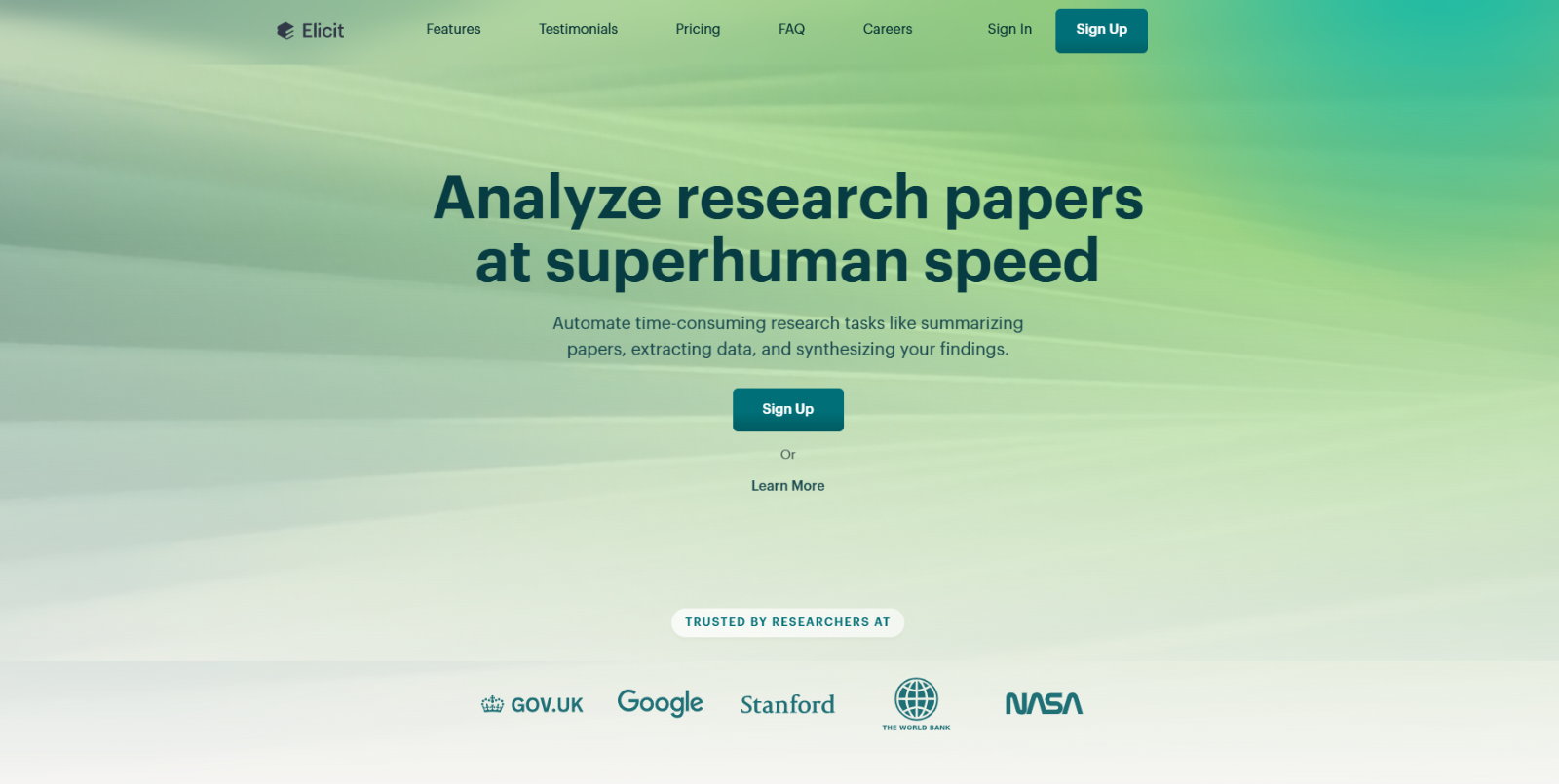
Elicit is an AI-powered research assistant designed to streamline the research process for academics and professionals. By leveraging advanced language models, Elicit automates tasks such as summarizing research papers, extracting pertinent data, and synthesizing findings, thereby accelerating literature reviews and data analysis.
Best for:
Researchers and academics seeking to enhance efficiency in literature reviews, data extraction, and synthesis across various scientific disciplines.
Key Features:
- Comprehensive Paper Search: Access a vast database of over 125 million academic papers by posing research questions in natural language.
- Summarization: Receive concise, one-sentence summaries of research papers, facilitating quick assessment of relevance.
- Data Extraction: Organize extracted details from selected papers into structured tables for easy analysis.
- Synthesis: Identify overarching themes and concepts across multiple papers to gain a holistic understanding of a research topic.
- PDF Upload: Upload personal PDFs to summarize and extract information, integrating seamlessly with existing research materials.
- Citation Management Integration: Save and export work to citation managers like Zotero, ensuring organized referencing.
Pricing:
- Basic: Free – Unlimited search across more than 125 million papers.
- Plus: $12 per month – Extract data from 25 PDFs per month.
- Pro: $49 per month – Conduct systematic reviews with guided workflows.
- Team: $79 per user per month – Collaborative live-editing and sharing for Notebooks and Systematic Reviews.
2. Consensus
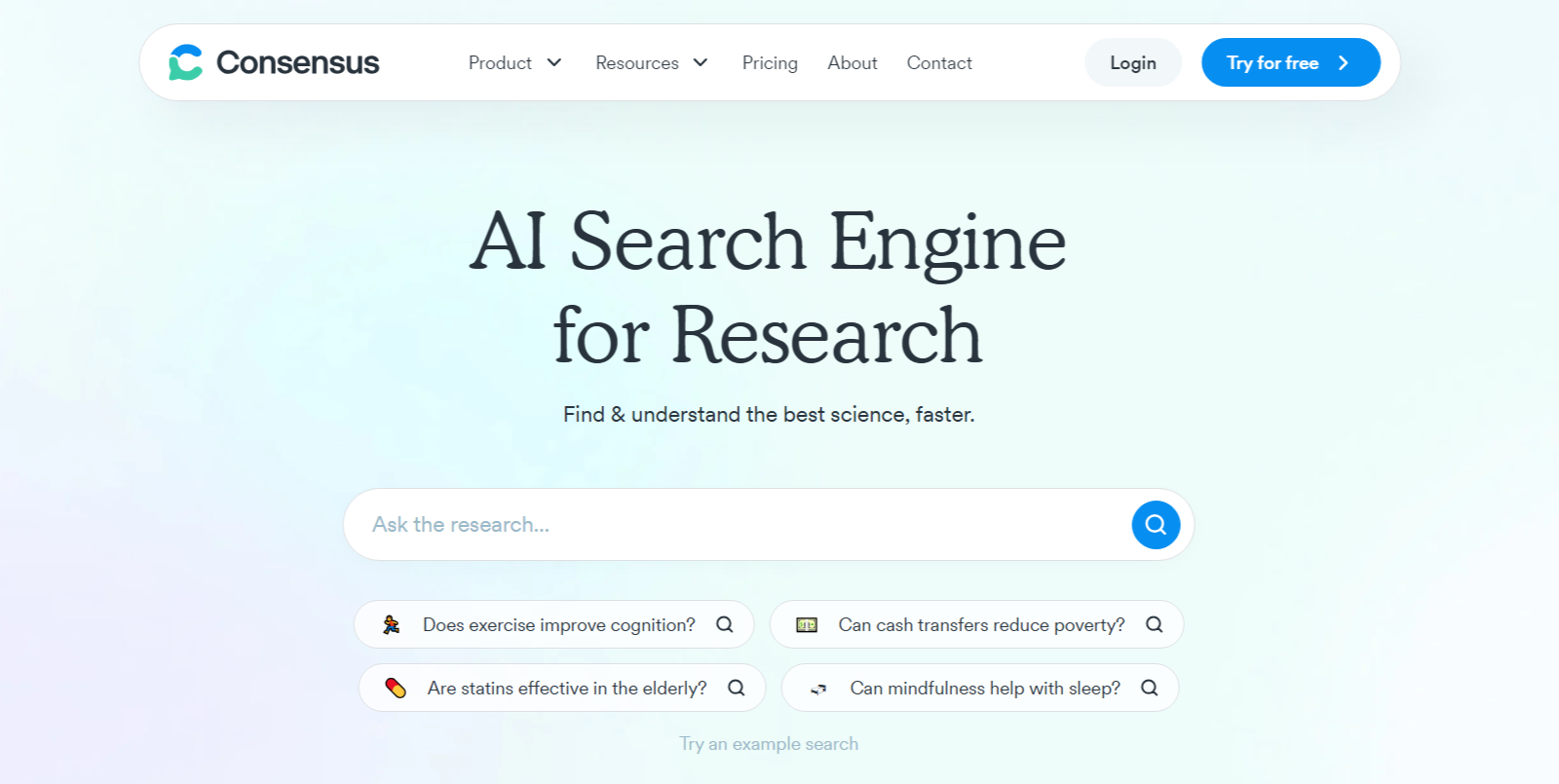
Consensus is an AI academic search engine designed to help researchers find and understand scientific literature more efficiently. By leveraging advanced language models, Consensus provides evidence-based answers to research questions, streamlining the literature review process.
Best for:
Students, researchers, and professionals seeking to quickly access and comprehend scientific studies across various domains.
Key Features:
- Extensive Research Coverage: Search through over 200 million research papers across all scientific disciplines.
- AI-Powered Insights: Utilize tools like the Consensus Meter and Pro Analysis to gain rapid insights, leveraging both OpenAI and custom large language models (LLMs).
- Relevant Paper Discovery: Employ proprietary search tools and filters to identify the most pertinent and reliable research papers efficiently.
- Cited Results: All information provided is directly linked to the original research papers, ensuring transparency and credibility.
Pricing:
- Free: $0/month – Access to essential search functionalities with limited GPT-4 powered analyses.
- Premium: $11.99/month – Unlimited GPT-4 powered Pro Analyses and Study Snapshots.
- Teams: $12.99 per seat/month – Designed for research groups with centralized billing and account management.
- Enterprise: Custom pricing – Tailored for large organizations with over 200 users, offering significant discounts and dedicated support.
For more detailed information, you can visit Consensus’s pricing page.
3. Scite
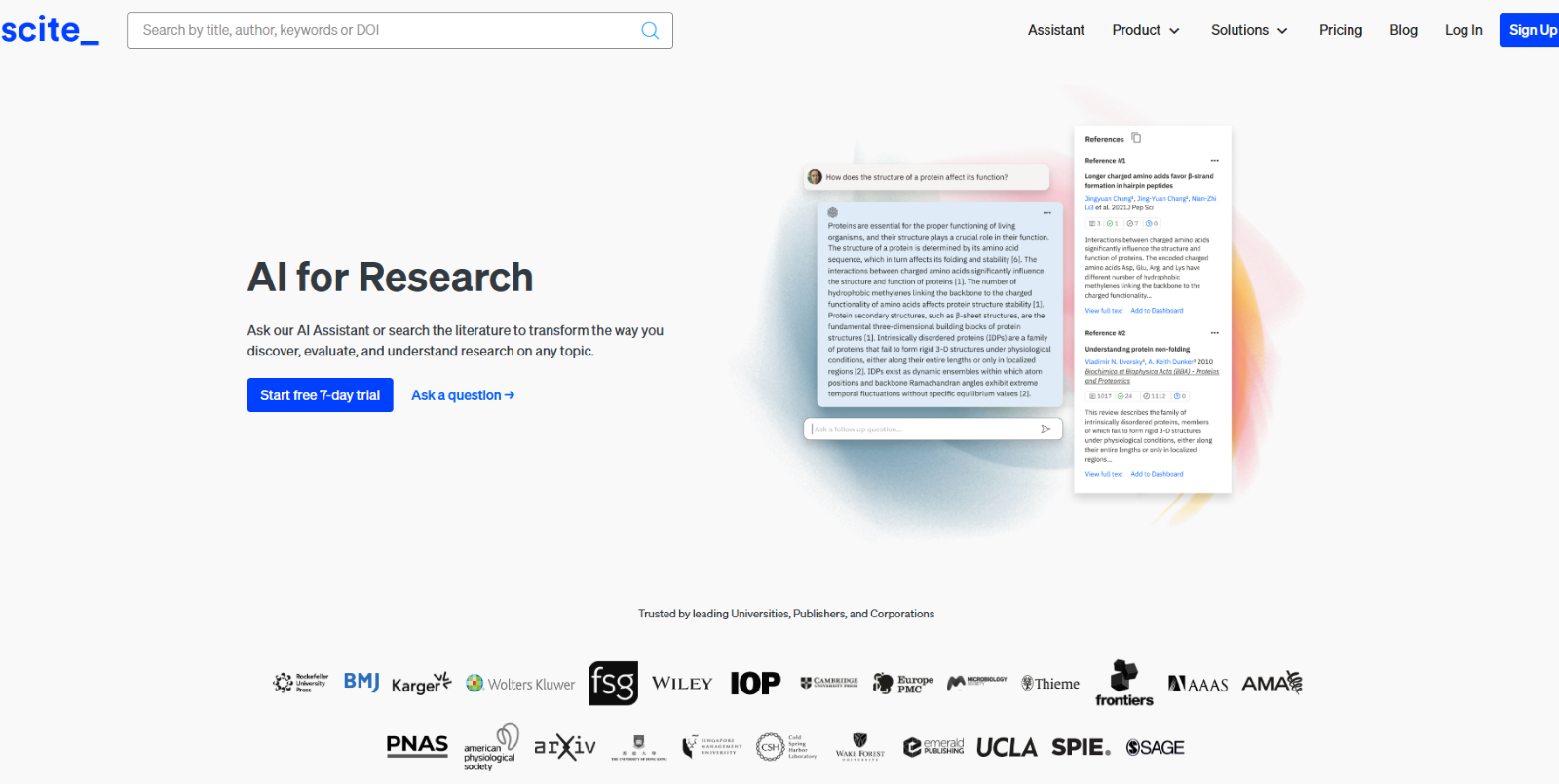
Scite is an AI-powered research tool designed to help researchers discover and evaluate scientific articles through Smart Citations. By analyzing over 1.2 billion citation statements from more than 200 million scholarly sources, Scite provides context to citations, indicating whether they offer supporting or contrasting evidence.
Best for:
Researchers, academics, and students aiming to assess the credibility and impact of research articles efficiently.
Key Features:
- Smart Citations: Understand the context of citations by seeing if subsequent research supports or contradicts a paper’s findings.
- AI-Powered Literature Search: Utilize Scite’s AI Assistant to ask research questions and receive evidence-based answers, enhancing literature discovery.
- Citation Statement Database: Access a vast database of citation statements to evaluate how publications have been cited by newer research.
- Research Tracking: Design personalized dashboards to track, analyze, and stay updated on curated collections of scientific literature.
Pricing:
- Personal: $20 per month – Unlimited Assistant chats.
- Organization: Custom pricing – All features included with centralized billing and admin controls.
4. Semantic Scholar
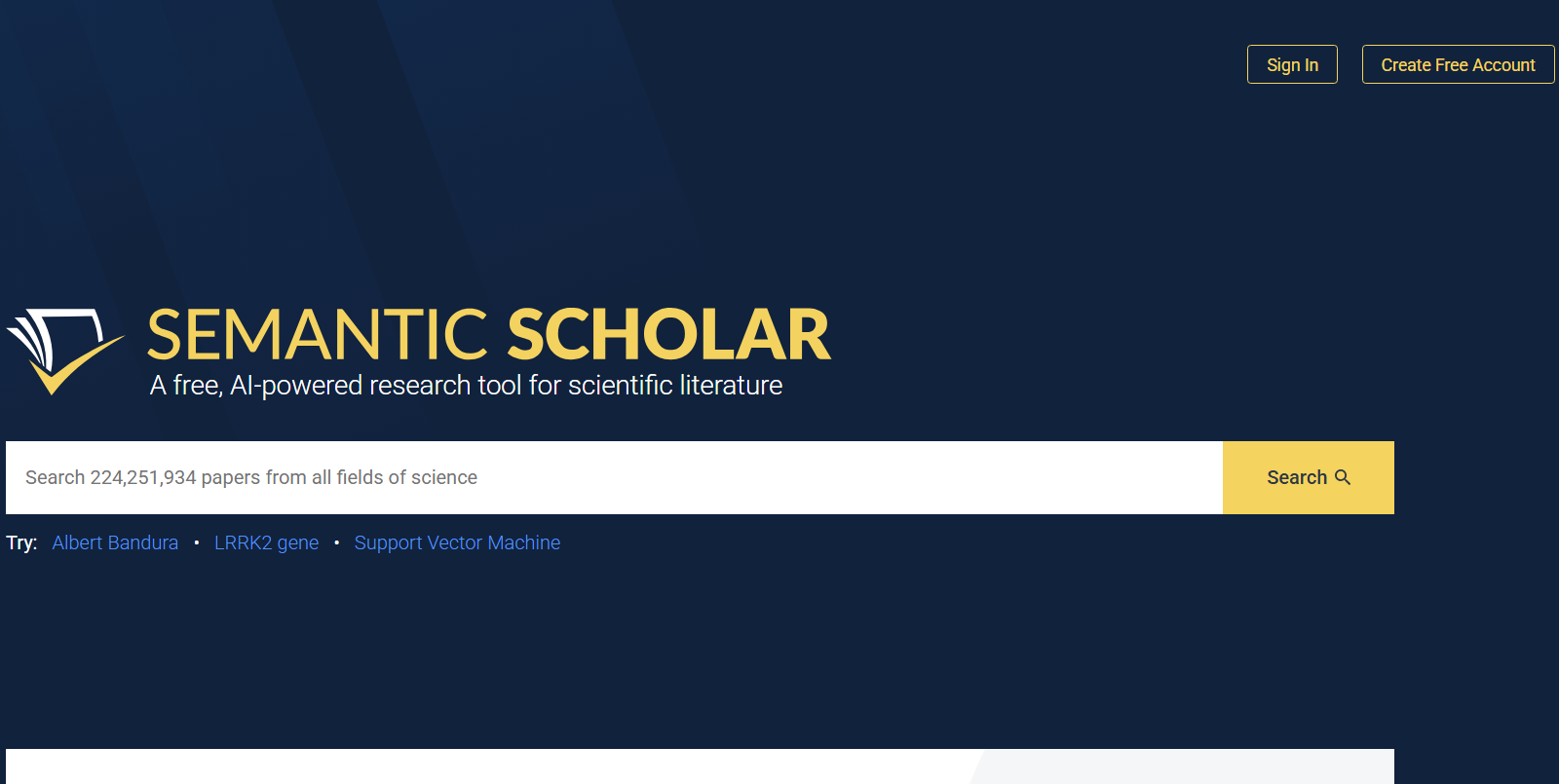
Semantic Scholar is a free, AI-powered research tool developed by the Allen Institute for AI, designed to help scholars discover and understand scientific literature efficiently. By utilizing advanced artificial intelligence and engineering, it comprehends the semantics of scientific texts, enabling users to navigate the vast landscape of academic research more effectively.
Best for:
Researchers, academics, and students across all scientific domains seeking an intelligent and efficient method to discover relevant research papers and stay updated with advancements in their fields.
Key Features:
- AI-Powered Search: Employs machine learning techniques to extract meaning and identify connections within papers, providing users with the most relevant search results.
- Semantic Reader: An augmented reader that makes scientific reading more accessible and richly contextual, offering features like in-line citation cards and skimming highlights to enhance comprehension.
- Research Feeds: An adaptive research recommender that uses AI to quickly learn users’ reading preferences and recommends the latest research to help scholars stay up to date.
- Comprehensive Database: Access to over 200 million publications from all fields of science, ensuring a broad and inclusive research experience.
Pricing:
Semantic Scholar is completely free to use, providing all its features without any subscription fees.
5. SciSpace (formerly Typeset.io)
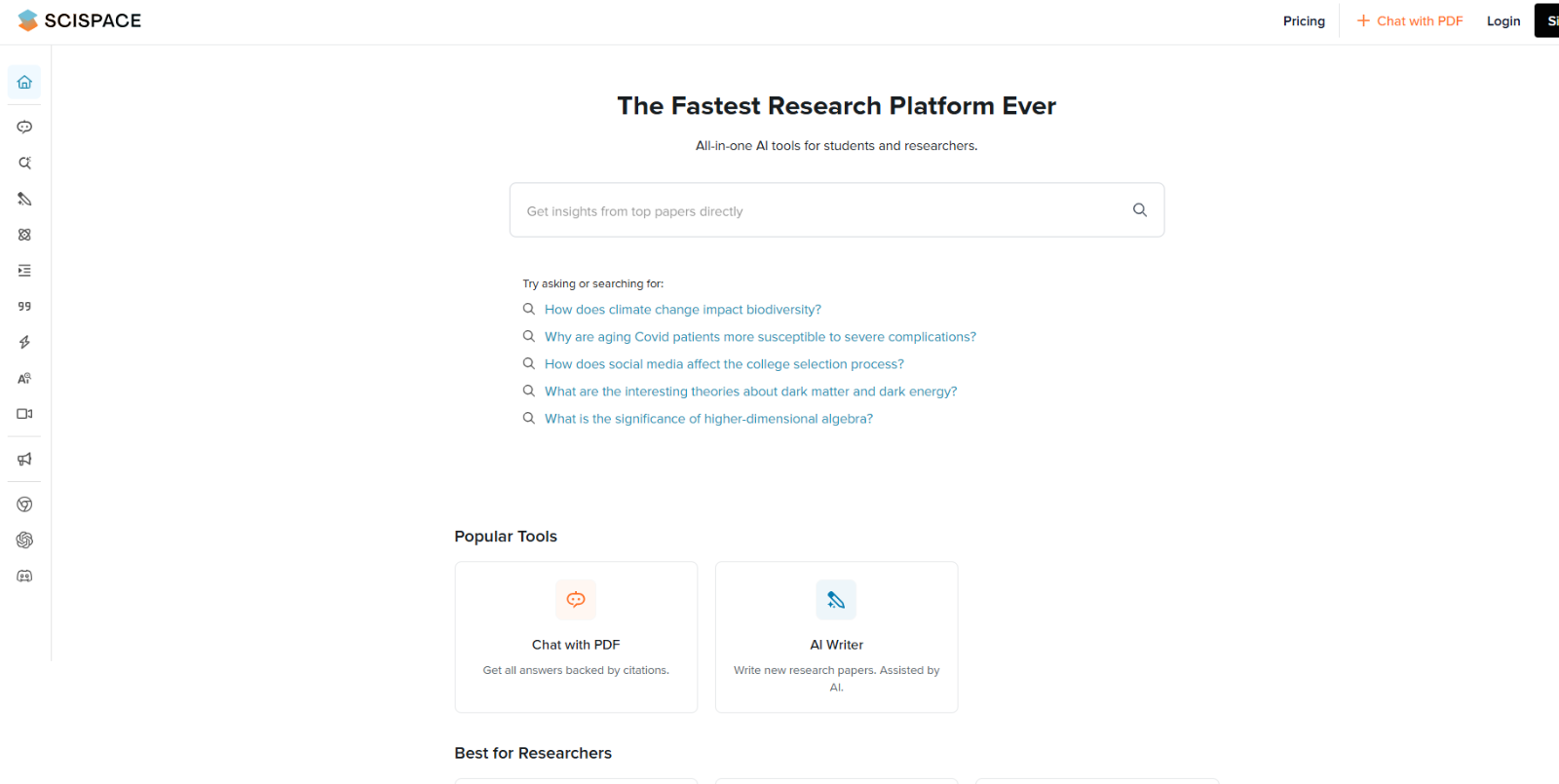
SciSpace, previously known as Typeset.io, is an AI-powered platform designed to assist researchers and students in navigating and understanding scientific literature. By leveraging advanced artificial intelligence, SciSpace offers tools to simplify complex academic texts, making research more accessible and efficient.
Best for:
Researchers, academics, and students seeking to enhance their comprehension of scientific papers and streamline the research process.
Key Features:
- AI-Powered Paper Summarization: Provides concise summaries of research papers, highlighting key points and findings.
- Simplified Explanations: Breaks down complex scientific concepts into understandable language, aiding in better comprehension.
- Extensive Research Database: Offers access to a vast collection of academic papers across various disciplines.
- Personalized Research Recommendations: Suggests relevant papers and topics based on user interests and reading history.
Pricing:
- Basic: $0 per month – Limited AI actions and literature review searches.
- Premium: $20 per month – Unlimited AI actions, chats with papers, and literature review searches.
- Labs & Universities: $18 per user/month – Includes all Premium features with additional team management and security options.
6. ResearchRabbit
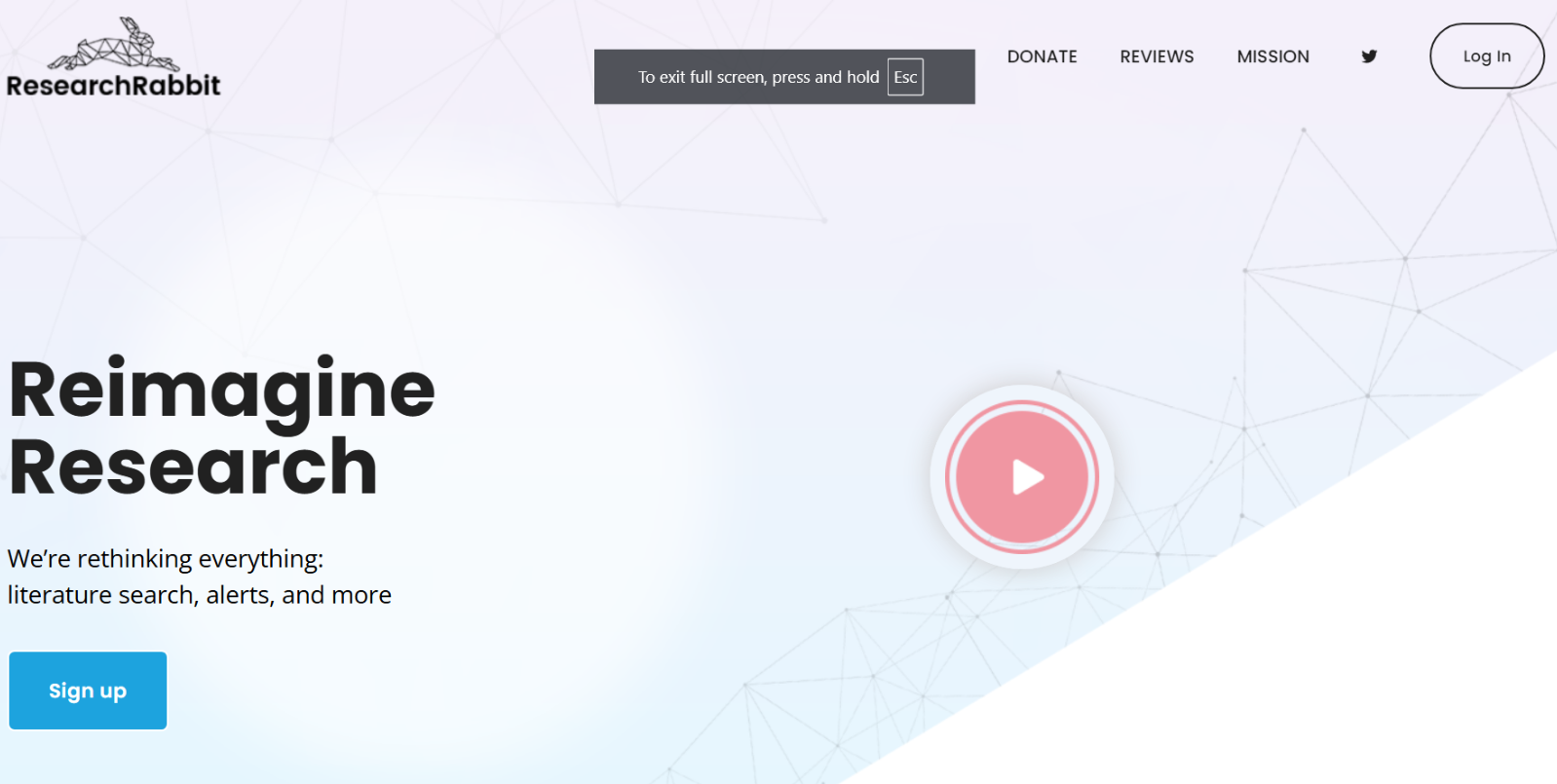
ResearchRabbit is a free AI-powered research tool that transforms how scholars discover and explore scientific literature. By utilizing advanced algorithms, it provides personalized recommendations and interactive visualizations, allowing researchers to efficiently navigate and analyze vast amounts of academic content.
Best for:
Academics, researchers, and students aiming to enhance their literature discovery process through intuitive exploration and dynamic visualizations.
Key Features:
- Personalized Recommendations: ResearchRabbit learns from your interests, providing tailored suggestions to keep you updated with the latest relevant papers.
- Interactive Visualizations: Visualize networks of papers and co-authorships, using graphs as new “jumping off points” to dive deeper into research topics.
- Collaborative Collections: Collaborate on collections, share your research with peers, and leave comments to facilitate collective exploration.
- Non-Spammy Alerts: Receive personalized digests to stay updated with the latest papers related to your collections, ensuring you never miss significant developments.
Pricing:
ResearchRabbit is committed to supporting the academic community by offering its services free of charge, ensuring that researchers have unrestricted access to its powerful tools.
7. AnswerThis
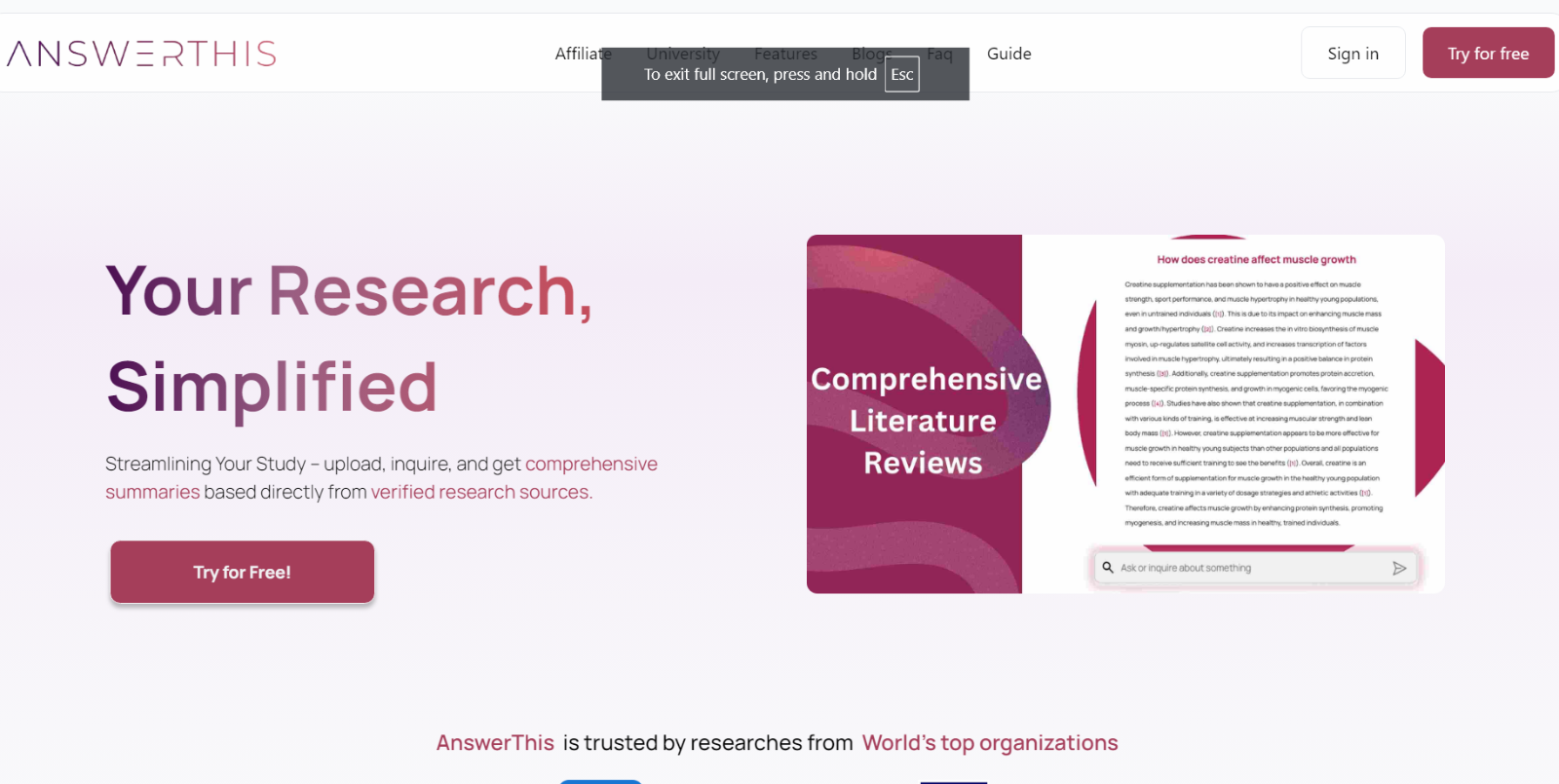
AnswerThis is an AI-powered research assistant designed to streamline the academic research process. By analyzing over 200 million research papers and reliable internet sources, AnswerThis generates comprehensive literature reviews, provides detailed source summaries, and offers tools to enhance the writing and organization of research materials.
Best for:
Academics, researchers, and students seeking to efficiently conduct literature reviews, manage research sources, and improve the quality of their academic writing.
Key Features:
- Comprehensive Literature Reviews: Generates in-depth academic literature reviews for any posed question, synthesizing information from a vast database of research papers and reliable internet sources.
- Source Summaries: Provides summaries of up to 20 sources used in literature reviews, including comprehensive overviews and access to original papers when available.
- Personal Research Library: Allows users to store and organize research materials, including the ability to upload personal papers and save sources from AnswerThis searches.
- Paper Editing Tools: Offers built-in features to refine and polish academic papers, enhancing the writing process.
Pricing:
- Free Forever: $0 per month – 6 total literature reviews and 8 document uploads.
- Passionate Researchers: $22 per month – Unlimited literature reviews and document uploads.
- Enterprise: $3,300+ per month – Unlimited access with a minimum of 150 users at $11 per user.
Conclusion
As artificial intelligence continues to evolve, AI-powered research assistants have become indispensable tools for academics, researchers, and students. These tools enhance efficiency, streamline literature reviews, improve citation management, and simplify complex data analysis, allowing researchers to focus on critical thinking and innovation rather than spending countless hours on manual tasks.
Whether you need comprehensive paper searches, citation verification, AI-powered summaries, or research visualizations, these 7 AI research tools offer unique functionalities to boost productivity and improve research accuracy. By integrating AI into their workflow, researchers can save time, gain deeper insights, and stay ahead in their fields.
Frequently Asked Questions (FAQs)
What is an AI research assistant?
An AI research assistant is a tool that leverages artificial intelligence to help researchers discover academic papers, summarize research, manage citations, and analyze data more efficiently.
How do AI-powered research tools improve academic research?
AI research tools streamline time-consuming tasks such as literature reviews, citation analysis, and paper summarization, enabling researchers to focus on their core studies and analysis.
Are AI research tools free to use?
Many AI research tools, such as Semantic Scholar and ResearchRabbit, offer free versions with essential features. However, some platforms provide premium plans with advanced functionalities for deeper research insights.
Which AI research assistant is best for finding academic papers?
Tools like Semantic Scholar, Elicit, and Consensus specialize in academic paper searches and literature reviews, making them ideal for researchers looking for high-quality, peer-reviewed studies.
Can AI research assistants replace human researchers?
No, AI tools are designed to support and enhance the research process, not replace human expertise. They provide faster access to information, improve organization, and offer analytical insights, but critical thinking and interpretation remain essential.
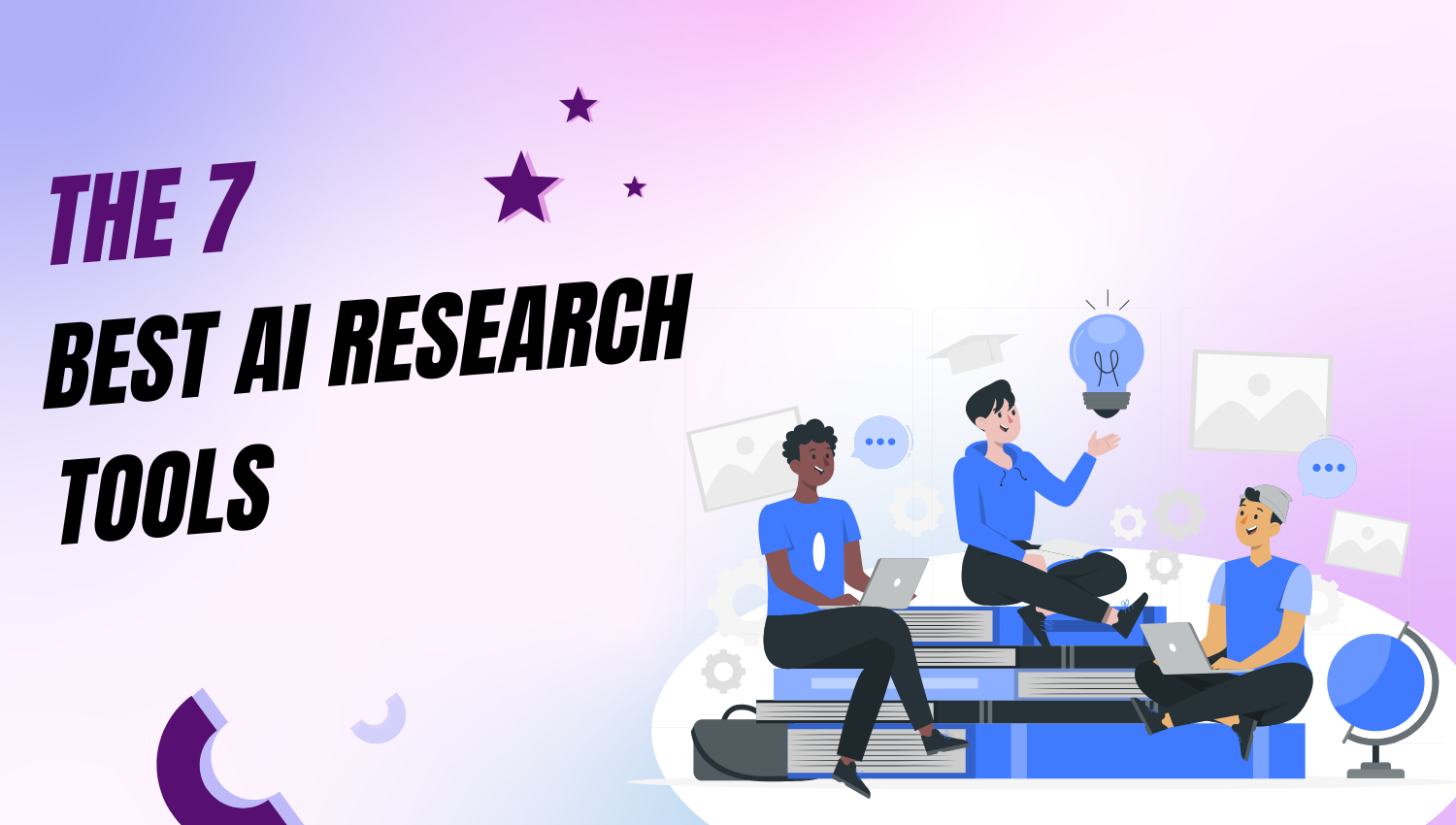
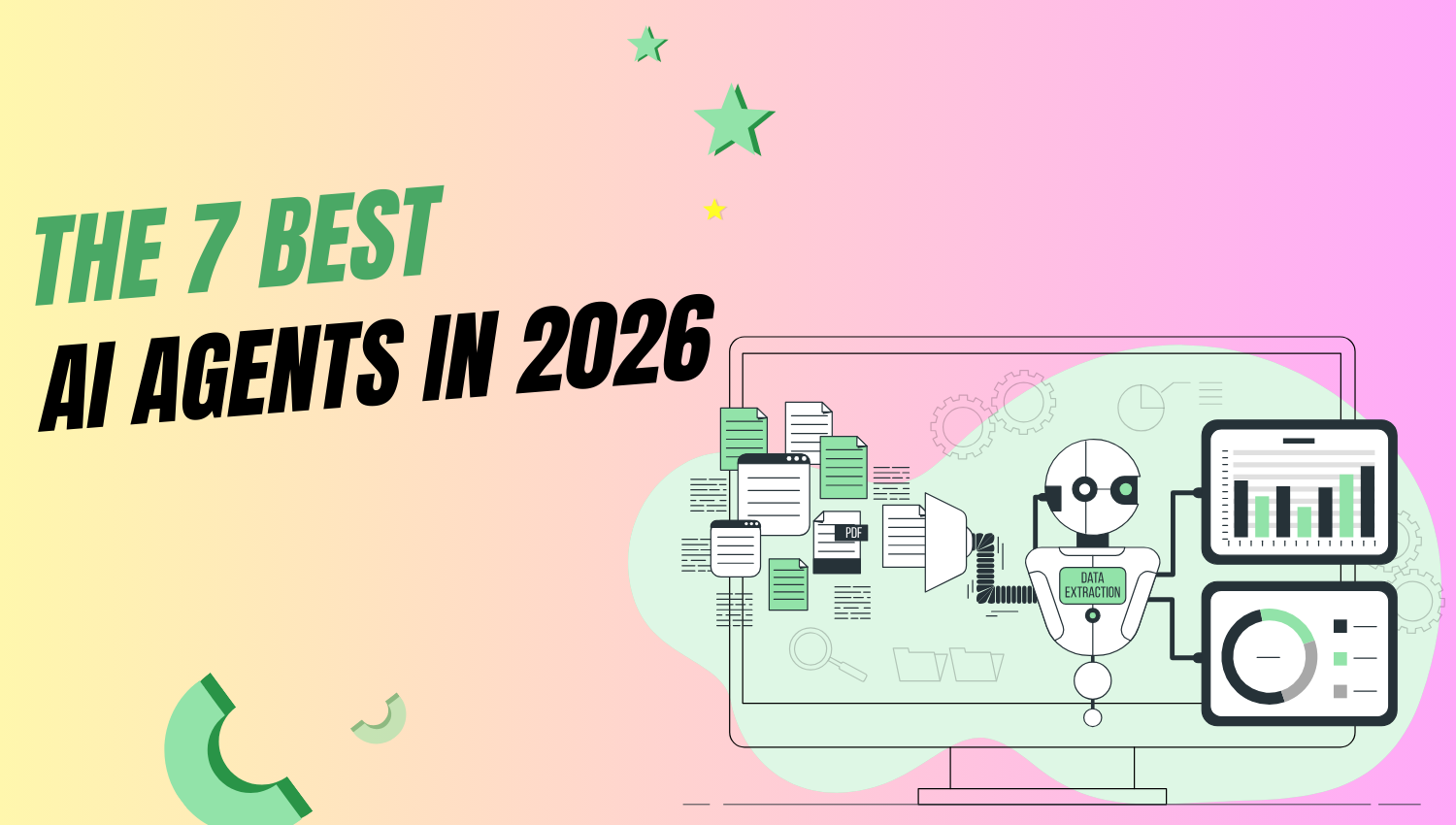
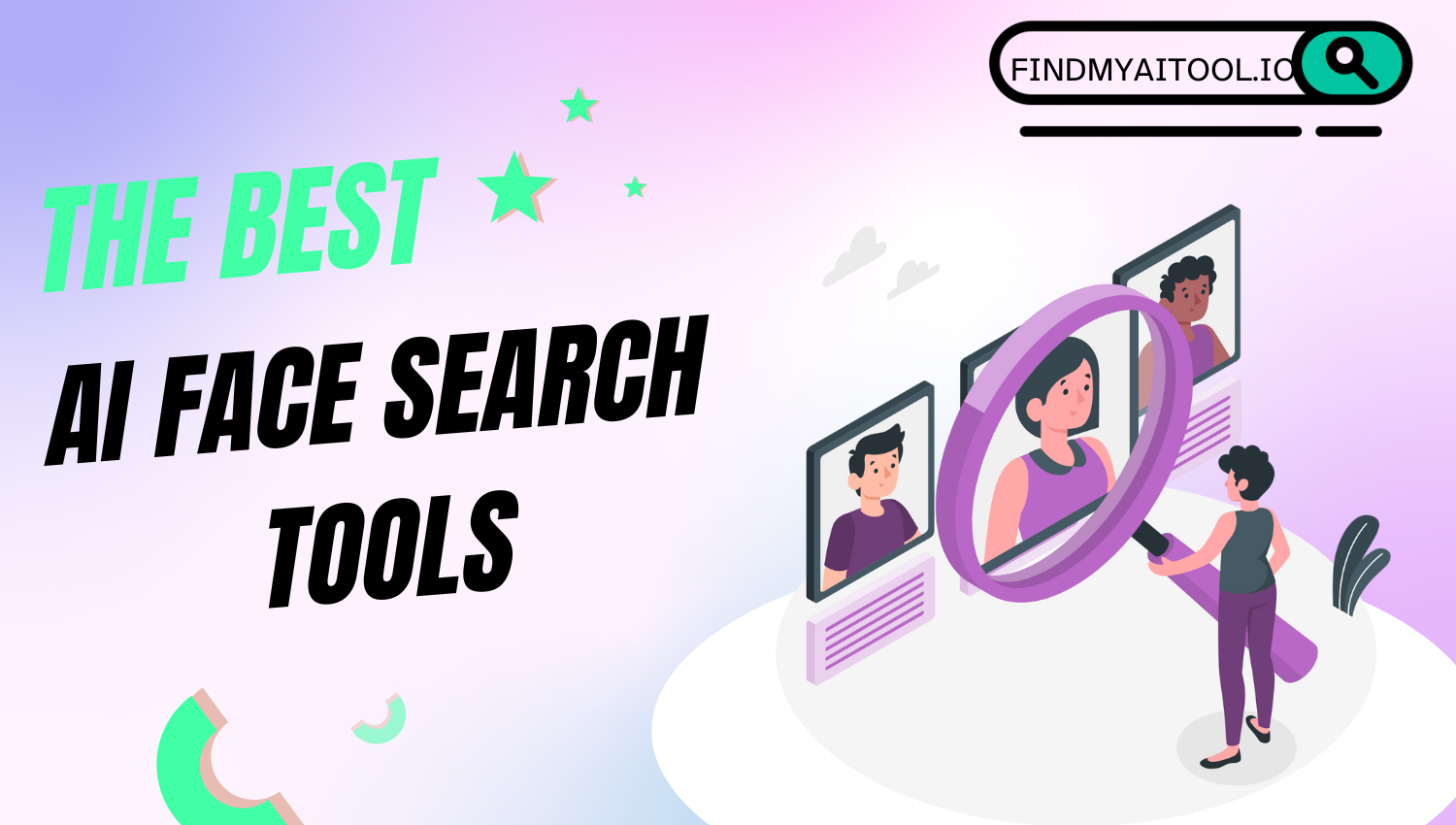
One Response
I’m really inspired with your writing skills as smartly as with the format to your blog. Is this a paid subject matter or did you modify it yourself? Anyway keep up the excellent quality writing, it’s rare to look a great weblog like this one today.